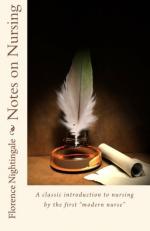FOOTNOTES:
[1] [Sidenote: Nurses often do not think the sick room any business of theirs, but only, the sick.]
I once told a “very good nurse” that the way in which her patient’s room was kept was quite enough to account for his sleeplessness; and she answered quite good-humouredly she was not at all surprised at it—as if the state of the room were, like the state of the weather, entirely out of her power. Now in what sense was this woman to be called a “nurse?”
[2] For the same reason if, after washing a patient, you must put the same night-dress on him again, always give it a preliminary warm at the fire. The night-gown he has worn must be, to a certain extent, damp. It has now got cold from having been off him for a few minutes. The fire will dry and at the same time air it. This is much more important than with clean things.
IX. LIGHT.
[Sidenote: Light essential to both health and recovery.]
It is the unqualified result of all my experience with the sick, that second only to their need of fresh air is their need of light; that, after a close room, what hurts them most is a dark room. And that it is not only light but direct sun-light they want. I had rather have the power of carrying my patient about after the sun, according to the aspect of the rooms, if circumstances permit, than let him linger in a room when the sun is off. People think the effect is upon the spirits only. This is by no means the case. The sun is not only a painter but a sculptor. You admit that he does the photograph. Without going into any scientific exposition we must admit that light has quite as real and tangible effects upon the human body. But this is not all. Who has not observed the purifying effect of light, and especially of direct sunlight, upon the air of a room? Here is an observation within everybody’s experience. Go into a room where the shutters are always shut (in a sick room or a bedroom there should never be shutters shut), and though the room be uninhabited, though the air has never been polluted by the breathing of human beings, you will observe a close, musty smell of corrupt air, of air i.e. unpurified by the effect of the sun’s rays. The mustiness of dark rooms and corners, indeed, is proverbial. The cheerfulness of a room, the usefulness of light in treating disease is all-important.




